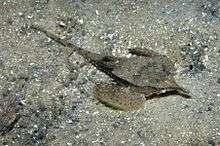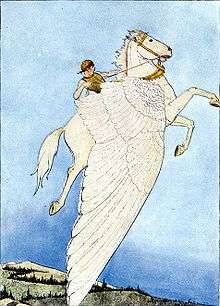Definify.com
Webster 1913 Edition
Pegasus
Peg′a-sus
,Noun.
[L., fr. Gr.
Πήγασος
.] 1.
(Gr. Myth.)
A winged horse fabled to have sprung from the body of Medusa when she was slain. He is noted for causing, with a blow of his hoof, Hippocrene, the inspiring fountain of the Muses, to spring from Mount Helicon. On this account he is, in modern times, associated with the Muses, and with ideas of poetic inspiration.
Each spurs his jaded
Pegasus
apace. Byron.
2.
(Astron.)
A northen constellation near the vernal equinoctial point. Its three brightest stars, with the brightest star of Andromeda, form the
square of Pegasus
. 3.
(Zool.)
A genus of small fishes, having large pectoral fins, and the body covered with hard, bony plates. Several species are known from the East Indies and China.
Definition 2026
Pegasus
Pegasus
Translingual

Pegasus lancifer
Etymology
Latin Pegasus (“mythical white winged stallion of Medusa and Poseidon”)
Proper noun
Pegasus m
- A taxonomic genus within the family Pegasidae – small fish with pectoral fins and body covered with hard, bony plates, from the East Indies and China.
Hypernyms
- (genus): Vertebrata - subphylum; Gnathostomata - infraphylum; Osteichthyes - superclass; Actinopterygii - class; Neopterygii - subclass; Teleostei - infraclass; Acanthopterygii - superorder; Gasterosteiformes - order; Pegasidae - family
Hyponyms
- (genus): Pegasus lancifer, Pegasus laternarius, Pegasus volitans - species
English

Pegasus and Bellerophon, from Mabie, Hamilton Wright (Ed.):Myths Every Child Should Know (1914) (1)
Proper noun
Pegasus
- (Greek mythology) A winged horse fabled to have sprung from the blood of Medusa when she was slain. He is noted for causing, with a blow of his hoof, Hippocrene, the inspiring fountain of the Muses, to spring from Mount Helicon. Bellerophon tamed and rode upon Pegasus when he defeated the Chimaera.
- (astronomy) An autumn constellation of the northern sky, near the vernal equinoctial point, said to resemble the mythical horse. Its three brightest stars, with the brightest star of Andromeda, form the square of Pegasus. It contains the stars Markab and Algenib.
Translations
mythical winged horse
|
|
constellation
Noun
Pegasus (plural Pegasi)
See also
- Bellerophon
- Enif
Finnish
Proper noun
Pegasus
Declension
| Inflection of Pegasus (Kotus type 39/vastaus, no gradation) | |||
|---|---|---|---|
| nominative | Pegasus | — | |
| genitive | Pegasuksen | — | |
| partitive | Pegasusta | — | |
| illative | Pegasukseen | — | |
| singular | plural | ||
| nominative | Pegasus | — | |
| accusative | nom. | Pegasus | — |
| gen. | Pegasuksen | ||
| genitive | Pegasuksen | — | |
| partitive | Pegasusta | — | |
| inessive | Pegasuksessa | — | |
| elative | Pegasuksesta | — | |
| illative | Pegasukseen | — | |
| adessive | Pegasuksella | — | |
| ablative | Pegasukselta | — | |
| allative | Pegasukselle | — | |
| essive | Pegasuksena | — | |
| translative | Pegasukseksi | — | |
| instructive | — | — | |
| abessive | Pegasuksetta | — | |
| comitative | — | — | |
See also
- Pegasos
pegasus
pegasus
English
Noun
pegasus (plural pegasuses or pegasi)
- A winged horse (imaginary or mythical, sometimes figurative).
Translations
winged horse
Latin
Etymology
From Ancient Greek Πήγασος (Pḗgasos)
Pronunciation
- (Classical) IPA(key): /ˈpeː.ɡa.sus/, [ˈpeː.ɡa.sʊs]
Noun
pēgasus m (genitive pēgasī); second declension
- pegasus (a winged horse or a bird with a horse's head, suspected to live in Africa)
- c. 43 CE, Pomponius Mela, De situ orbis libri III 3
-
Sunt mirae aves cornutae tragopanes et equinis auribus pegasi.
- [In Africa] there are wonderful birds: horned tragopans and pegasi with horse's ears.
-
Sunt mirae aves cornutae tragopanes et equinis auribus pegasi.
- c. 77 CE – 79 CE, Pliny the Elder, Naturalis Historia 8.72
-
Aethiopia generat […] pinnatos equos et cornibus armatos, quos pegasos vocant.
-
1855 translation by John Bostock and Henry Thomas Riley
- Æthiopia produces […] horses with wings, and armed with horns, which are called pegasi.
-
1855 translation by John Bostock and Henry Thomas Riley
-
Aethiopia generat […] pinnatos equos et cornibus armatos, quos pegasos vocant.
- c. 77 CE – 79 CE, Pliny the Elder, Naturalis Historia 10.26
-
Pegasos equino capite volucres et grypas aurita aduncitate rostri fabulosos reor, illos in Scythia, hos in Aethiopia.
-
1855 translation by John Bostock and Henry Thomas Riley
- I look upon the birds as fabulous which are called "pegasi," and are said to have a horse's head; as also the griffons, with long ears and a hooked beak. The former are said to be natives of Scythia, the latter of Æthiopia.
-
1855 translation by John Bostock and Henry Thomas Riley
-
Pegasos equino capite volucres et grypas aurita aduncitate rostri fabulosos reor, illos in Scythia, hos in Aethiopia.
-
Inflection
Second declension.
| Case | Singular | Plural |
|---|---|---|
| nominative | pēgasus | pēgasī |
| genitive | pēgasī | pēgasōrum |
| dative | pēgasō | pēgasīs |
| accusative | pēgasum | pēgasōs |
| ablative | pēgasō | pēgasīs |
| vocative | pēgase | pēgasī |